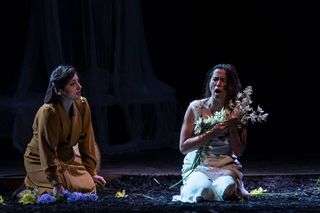|
Back
A problematic work Toronto
The Winter Garden Theatre
07/22/2016 -
Benjamin Britten: The Rape of Lucretia, opus 37
Emma Char (Lucretia), Iain MacNeil (Tarquinius), Jasper Leever (Collatinus), Owen McCausland (Male Chorus), Chelsea Rus (Female Chorus), Beste Kalender (Bianca), Ellen McAteer (Lucia), Peter Rolfe Dauz (Junius)
Ensemble conducted by Christopher Mokrzewski
Anna Theodosakis (director), Chantal Labonté (lighting designer)

B. Kalender & E. Char (© Don Lee)
Opera is unfortunately a rare commodity in Canada’s summer. Partial evidence of this is the fact that Toronto’s Summer Music Festival has not featured a performance since 2008. This single outing of The Rape of Lucretia actually piggy-backs on an earlier three-performance run at the Banff Centre in Alberta (some 3000 km distant). Toronto-based Against the Grain Theatre and the Canadian Opera Company were also involved.
In Banff the production was staged under the direction of Paul Curran, while in Toronto the singers had to share the stage with the 12-member orchestra. (The Winter Garden has no pit.) Anna Theodosakis effectively staged the action on stage left. The stage’s bare brick wall turned out to be a suitable background for both scenes, while Chantal Labonté’s lighting heightened the drama throughout.
The simmering macho hostility that suffuses the badinage between the men in the opening scene was marvelously captured. The following scene featuring the women (Lucretia and her nurse and maid) is more conventional scene-setting, although the uneasy repeated “good nights” after the arrival of the intruder Tarquinius roused uneasy laughter. Tarquinius’s invasion of Lucretia’s chamber was effectively staged. After that, though, the structure of the work with the persistent intervention of the Male and Female Chorus creates problems this staging failed to overcome.
Seven of the eight singers, plus conductor Christopher Mokrzewski, also performed in Banff. Owen McCausland was outstanding as the Male Chorus, the narrator/commentator role Britten created for Peter Pears. (McCausland also excelled in a similar role, the narrator in Monteverdi’s Il combatimento, for the COC last fall.) Tension lessened when the Female Chorus entered. Chelsea Rus has a fine voice, but the domestic scene she narrates just doesn’t have the tension of the men’s scene. The director also had the two “choristers” enact a sort of bickering byplay; this made for momentary drama, but leading to what? In the absence of projected titles the audience had quite a job trying to follow both plot, background and commentary; adding stage business like this did not clarify things.
Emma Char was appropriately soulful in the title role, although the intense feeling of shame following the rape seemed to have internalized her voice rather then releasing it. Iain MacNeil, still a member of the COC’s Ensemble Studio, has displayed comedic talent in previous roles and is effective here as one of the creepiest villains in opera. A real find is young Dutch bass-baritone Jasper Leever who creates a sympathetic Collatinus.
There is something deeply unsatisfying in the structure of the work toward the end. Immediately after Lucretia’s suicide, Junius starts to exploit the situation from a political angle, citing the crime as a reason for Rome to overthrow the monarchy (which is what happened according to the historical record of the time). But also the two chorister/commentators recommence their boilerplate Christ-centered metaphors. They come across as evangelists exploiting a tragedy to further their own ends; their persistence reminds one of Bob Boles, the ranting Methodist in Peter Grimes. A more fitting conclusion to the work is thus hijacked. We never get to see Tarquinius again - is he remorseful? Triumphalist? Hiding? The shocked reaction of Collatinus, Bianca, and Lucia - and by extension that of the audience - is simply not given its proper due.
The Rape of Lucretia has much in common with the seminal English operatic masterpiece, Purcell’s Dido and Aeneas. (This point was discussed by Britten in a letter written in the 1940s when the possibility of a production featuring both works was briefly contemplated.) Each has a similar dramatic arc as it relates the tale of a noble woman traduced who them commits suicide. Despite Britten’s sinewy music, the structure of his work blunts the effect it deserves to have. Purcell’s music is arguably too pretty for its plot, but its direct simplicity makes it the more successful work.
Michael Johnson
|